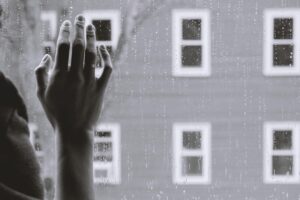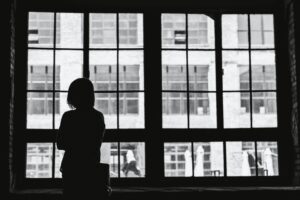Claire Hemme
Communications Coordinator
Recently I noticed myself forcing my gaze from the floor back into the eyes of a peer for the third time in a single conversation. “How strange,” I thought to myself, “Why is this so hard?”
I’ve been a natural communicator since childhood, nearly everyone in my life knows me as a social butterfly. In fact, I love communication so much I pursued a degree in it. So why am I suddenly finding conversations so difficult to navigate?

These new behavioral oddities lead me to start asking others if they were feeling as socially inept as I have lately. Several, if not most, reported feeling “off” or even “nervous” during social interactions. After considering the common variable between myself and those I spoke with, the root cause appeared clear: Social distancing and quarantine have affected the way we communicate. We are seeing the effects of social isolation.
Social isolation is defined as a lack of social connection and is often synonymous with simply being lonely. Typically, research and concern for social isolation focus on the elderly population and minority groups. However, the CDC suggests that the LGBTQ community and first-generation immigrants are also at a higher risk for social isolation due to language barriers, stigma, and discrimination.
Loneliness can result in a myriad of health issues. Studies on older demographics have shown loneliness linked to depression and lack of sleep. In more severe circumstances social isolation showed evidence of early dementia, decreased cognitive ability, decreased cardiovascular health, and sometimes even early mortality.
In the past, social isolation has generally been related to things like severe illness or disabilities. Some studies have also looked at the relationship between social isolation and the steady generational decrease in social activities like religion, volunteering, and marriage. 
Now, however, COVID-19 has leveled the playing field. Since the pandemic started, we’ve had no choice but to say goodbye to regular gatherings and hello to zoom calls and holding our breath when we pass people at the grocery store. The effects of social isolation apply to everyone, and we need to acknowledge these risks.
While the social distance is necessary, we need to monitor the effects it could be having on our adolescents. Recent studies have researched the relationship between social isolation and adolescence in mice. One study from the Society for Neuroscience links social disconnection with a change in brain structure and altered development and decision making skills.
Of course, humans are far more complex than mice, but the evidence of loneliness and its negative correlation with cognitive function is nothing to be ignored. We need to be putting our mental and social health on the forefront.
Adolescents experiencing social isolation might exhibit signs of depression, anxiety, sleep deprivation, or negative habitual behavior. If you’ve noticed these signs and you don’t know what to do, you can call YouthZone.
YouthZone is here for you, we offer several programs including counseling and parenting education that could benefit your family in such uncertain times. We are here to make sure no one feels alone.
In order to combat the disconnect that can stem from social distance, you can:
- Provide consistent support within your home or from a professional.
- Initiate meaningful daily interactions like calls with friends or family members.
- Avoid situations that trigger social anxiety.
- Open up conversations to target and resolve negative thought patterns that arise.
- Speak openly and often about troubles and concerns your family is experiencing.
Remember to acknowledge that loneliness is valid and common for all of us to feel right now. While we may have to wait to resume gathering in person, a friendly voice and a “How was your day?” are always just on the other side of a phone call or zoom invitation. Times are tough but together, we can lift each other up and get through this.
If you think your child could benefit from some extra support, call YouthZone today at 945-9300 or learn more at www.YouthZone.com.
Sources:
https://www.eneuro.org/content/6/5/ENEURO.0318-19.2019
